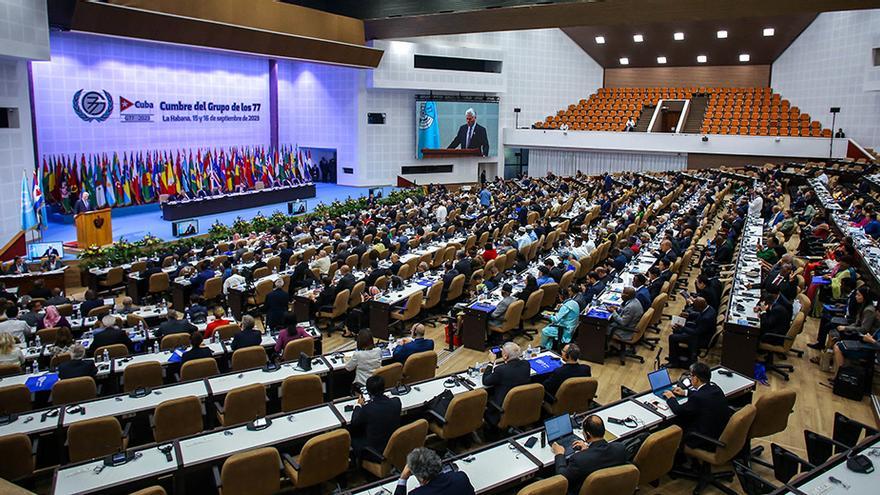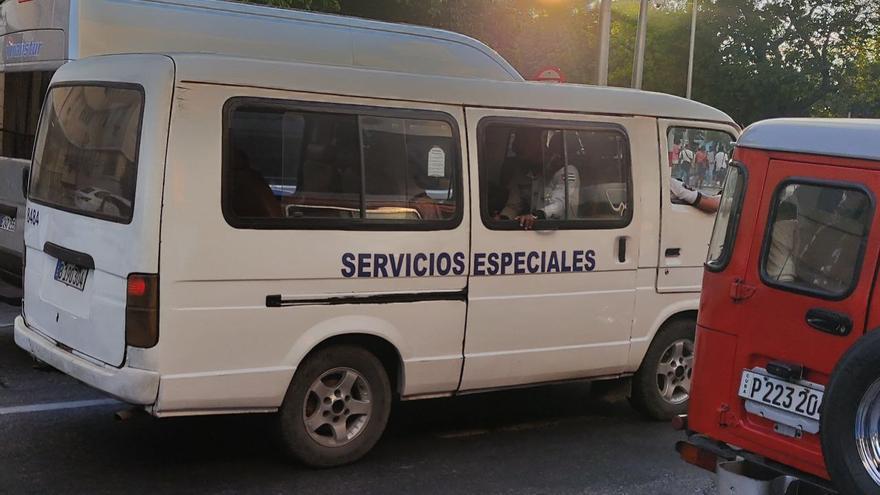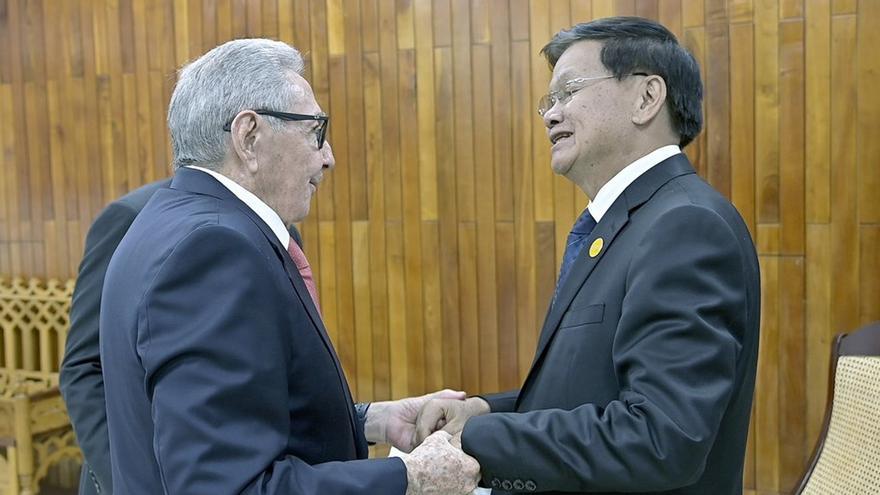
![]() 14ymedio, Havana, 16 September 2023 — Without surprises or uncomfortable statements for the Havana regime, the leaders of the Group of 77 plus China have paraded this weekend through the visitor gallery of Havana’s Palace of Conventions. Raúl Castro has abandoned his retirement to meet several world leaders, and the atmosphere in the city is tense. Discreet buses of members of the Ministry of the Interior patrol the most central streets, and since Friday, the presence of people on the streets has decreased significantly.
14ymedio, Havana, 16 September 2023 — Without surprises or uncomfortable statements for the Havana regime, the leaders of the Group of 77 plus China have paraded this weekend through the visitor gallery of Havana’s Palace of Conventions. Raúl Castro has abandoned his retirement to meet several world leaders, and the atmosphere in the city is tense. Discreet buses of members of the Ministry of the Interior patrol the most central streets, and since Friday, the presence of people on the streets has decreased significantly.
The preventive detention of several dissidents has underlined the message of the authorities: everything must be under control during the Summit, not only in the capital but also in the provinces. Opponent Guillermo Fariñas was arrested this Friday in Santa Clara, hundreds of miles from Havana, “because there was an order that he could not leave” during the weekend, he told the media.
Fariñas, 61, was not even interrogated during the six hours he remained in the Criminal Investigation Unit. They arrested him on his way home from a friend’s, and, when he was released, they warned him that he could not leave his home again. On the social network X (formerly Twitter), Fariñas protested by stating that his house was not a cabozo [jail] and that he planned to go out again.
Varios activistas de la sociedad civil cubana se encuentran sitiados, bajo vigilancia de la Seguridad del Estado, mientras la Cumbre del Grupo de los 77 + China, comienza en La Habana.
Abrimos hilo sobre los actos represivos🧵👇👇 pic.twitter.com/Ni8LOUA0Id— Cubalex (@CubalexDDHH) September 15, 2023
X/Twitter text: Several Cuban civil society activists are besieged, under the supervision of State Security, while the Group of 77+ China Summit begins in Havana. We are opening a thread about repressive acts. — Cubalex (@CubalexDDHH)
According to Cubalex, other activists and opponents have been harassed to prevent them from protesting during the Summit. This is the case of former political prisoner Rolando Kessel and activists Yanet Martínez and Félix Valdés – “sitting at home” – in addition to Pedro Quiala and Carlos Milanés, who are “under the surveillance of State Security.” Most of the opponents living on the Island have reported Internet outages since this Friday.
Connectivity problems have not only affected dissidents but have also spread throughout the country. Difficulties in accessing the Internet have been more evident when posting or viewing images and videos on Facebook. In addition, instant messaging services such as Telegram and WhatsApp have been at half-speed for the whole week.

This newspaper captured a video of a vehicle of the Special Services of the Ministry of the Interior as it roamed the streets of the Cuban capital. Halfway between a minibus and a white van, it is not the one usually used by the Cuban military, who travel in black vehicles.
Inside the Palacio de las Convenciones, guests to the Summit from the 134 member countries have praised the hospitality of Havana. In his speech to the leaders, Miguel Díaz-Canel alleged that international relations needed more “democratization,” a statement that was applauded by the Secretary General of the United Nations, António Guterres.
He also asked that the world economic “rules of the game” be changed, to favor underdeveloped countries such as Cuba, which he described as a “victim” of international finance.
Although the celebration of an event of this caliber is a logistical challenge for any country, the Island has not missed the opportunity to preside over the Group of 77. Several of its most important allies have converged in Havana, such as Venezuelan President Nicolás Maduro, Nicaraguan Daniel Ortega, Argentine Alberto Fernández, Brazilian Luiz Inácio Lula da Silva and Colombian Gustavo Petro.

The great “attraction” for many of the foreign visitors has been the presence at the Summit of Raúl Castro, who abandoned his traditional military uniform to wear a suit during his meetings with several leaders.
Castro met with Guterres this Friday, in addition to Mexican Chancellor Alicia Bárcena, the president of Laos, Thongloun Sisoulith, and the president of Mongolia, Khurelsukh Ukhnaa. However, the official press offered few details about these meetings and limited itself to stating that Castro had promised the UN Secretary-General to work for “sustainable development” in Cuba. This Sunday, the Summit will hold its last working session.
Translated by Regina Anavy
____________
COLLABORATE WITH OUR WORK: The 14ymedio team is committed to practicing serious journalism that reflects Cuba’s reality in all its depth. Thank you for joining us on this long journey. We invite you to continue supporting us by becoming a member of 14ymedio now. Together we can continue transforming journalism in Cuba.
